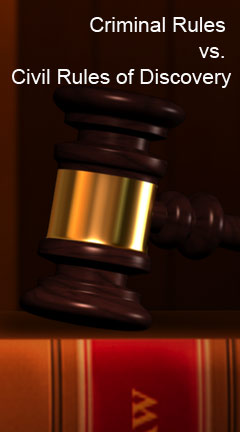Aviso de archivo
Esta es una página de archivo que ya no se actualiza. Puede contener información desactualizada y es posible que los enlaces ya no funcionen como se pretendía originalmente.
Home | Glossary | Resources | Help | Course Map
The rules for criminal discovery differ from rules for civil discovery.
In the criminal setting, defendants must usually point to a rule of criminal procedure, statute or other entitlement to obtain discovery from the government. Additionally, there are certain protections for the accused in criminal trials that have an impact on the discovery process.
First, a constitutional guarantee against self-incrimination limits discovery from defendants in criminal cases. This is based on the Fifth Amendment to the Constitution, which holds that defendants in a criminal case cannot be forced to testify against themselves or give evidence against their own interest.
Our nation's founders were concerned about forced confessions to such a degree that protection from self-incrimination is deeply ingrained in U.S. criminal law practice. Because of the fear of forced self-incrimination, the prosecution in a criminal case has limited access to the files, records, documents and projected testimony of a criminal defendant before trial.
Certain identifying items, such as blood, hair, urine, handwriting, breath, fingerprints, footprints or voice exemplars have been carved out as acceptable prosecution discovery products. Search warrant power "on good cause shown" allows government officers access to the files, records and premises of a criminal suspect or defendant.
Second, under the FRCrimP, defendants are allowed a number of remedies in order to probe government files in preparation for trial. The FRCrimP typically allows some discovery by defendants through the prosecution's case preparation files. The practice of many states parallels the federal practice.
Under the FRCrimP, for example, the government must disclose statements of the defendant, the defendant's prior criminal record, documents, other objects which are intended to be evidence at trial, and reports of examinations and tests.
The government does not have to disclose internal government documents, inspections, or reports in connection with an investigation or prosecution of a criminal case, or statements made by government witnesses or prospective government witnesses, except as provided by detailed statutory exceptions. (Source: 18 U.S.C. § 3500.)
Finally, under the FRCrimP, a defendant must provide copies of documents that are intended to be used at trial if the defendant has asked for production from the government. The same is true for reports of examinations and tests. Defense memos or documents created in connection with the investigation or defense of the case by the defendant, the defendant's attorney or their agents (which includes experts) need not be produced.
Note that, although discovery is generally more extensive in civil than in criminal cases, attorneys are not allowed to use civil discovery rules to obtain information that would otherwise be unobtainable through application of the criminal rules of discovery.
(Sources: Giannelli, Paul C., "Ake v. Oklahoma: The Right to Expert Assistance in a Post-Daubert, Post-DNA World," Cornell Law Review 89 (September 2004): 1305, 1417; and 23 Am. Jur. 2d Depositions and Discovery § 232.)
Additional Online Courses
- What Every First Responding Officer Should Know About DNA Evidence
- Collecting DNA Evidence at Property Crime Scenes
- DNA – A Prosecutor’s Practice Notebook
- Crime Scene and DNA Basics
- Laboratory Safety Programs
- DNA Amplification
- Population Genetics and Statistics
- Non-STR DNA Markers: SNPs, Y-STRs, LCN and mtDNA
- Firearms Examiner Training
- Forensic DNA Education for Law Enforcement Decisionmakers
- What Every Investigator and Evidence Technician Should Know About DNA Evidence
- Principles of Forensic DNA for Officers of the Court
- Law 101: Legal Guide for the Forensic Expert
- Laboratory Orientation and Testing of Body Fluids and Tissues
- DNA Extraction and Quantitation
- STR Data Analysis and Interpretation
- Communication Skills, Report Writing, and Courtroom Testimony
- Español for Law Enforcement
- Amplified DNA Product Separation for Forensic Analysts


